We run our website the way we wished the whole internet worked: we provide high quality original content with no ads. We are funded solely by your direct support. Please consider supporting this project.
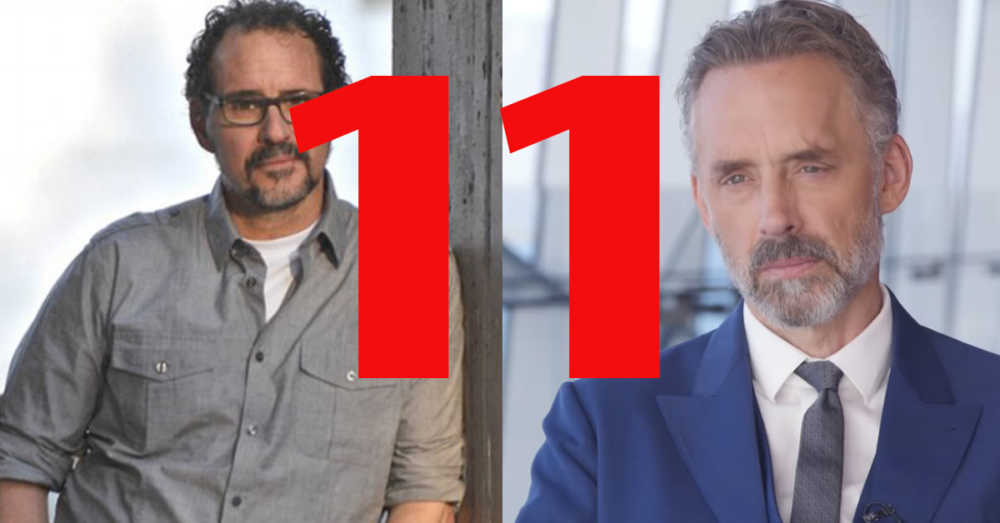
Part 11 (of 15): The Corruption of Creation
Assessing Jordan Peterson’s 12 Rules for Life
by Greg Boyd
“With their capacity for aggression strait-jacketed within a too-narrow morality, those who are only or merely compassionate and self-sacrificing…cannot call forth the genuinely righteous and appropriately self-protective anger necessary to defend themselves.”
Jordan Peterson
In the previous three posts (post 8, post 9, post 10) I have offered a critical evaluation of Peterson’s thinking on hierarchies, race, and masculinity and femininity from a strictly “natural” perspective (viz. not presupposing a faith perspective). In this and the following post, however, I will critically assess aspects of Peterson’s thought that we covered in posts 5-7 (post 5, post 6, post 7) from a distinctly Christian perspective. (Warning: my evaluation presupposes that readers have read these earlier posts).
The Lack of a Primordial Fall
I begin by expanding on something I mentioned back in my second post (post 2): namely, that Peterson leaves no room for any possibility that something has gone fundamentally wrong with the world as we currently experience it. That is, he lacks any concept of a “Fall,” whether human or angelic. Hence, while we humans bring about a good deal of unnecessary suffering through our evil or just plain stupid choices, suffering itself is not the result of anything having gone wrong. It is rather inherent in Being, for to exist is to be limited and vulnerable. (It’s apparent that Peterson’s thought rules out the Christian doctrine of heaven as well as the Fall).(1)
Moreover, because Peterson has no concept of a Fall, especially of an angelic Fall, and therefore doesn’t believe anything has gone wrong with creation, he argues that whatever reality, as he understands it, “selects” is “in some sense correct,” as was discussed in post 8. I will now contend that, if we take seriously the biblically-based traditional Christian teaching that there was an angelic rebellion at some point in the primordial past, and if we place this traditional teaching within an evolutionary framework, it will deepen Peterson’s axiom, in one sense, but negate it, in another.
To make my case, I must first provide a brief summary of the view of Satan and “principalities and powers” that was shared by Jesus, the authors of the New Testament (NT), and every Christian theologian throughout history until the very recent past.(2)
The Authority of Satan and the Powers
In keeping with the apocalyptic worldview of their day, the NT has a significant number of references to “rulers,” “principalities,” “powers,” and “authorities” (Rom. 8:38; 13:1; I Cor 2:6, 8; 15:24; Eph 1:21; 2:2; 3:10; 6:12; Col 1:16: 2:10, 15), along with “dominions” (Eph 1:21; Col 1:16), “cosmic powers” (Eph 6:12), “thrones” (Col 1:16), “spiritual forces” Eph 6:12), “elemental spirits of the universe” (Col 2:8, 20; Gal 4:3, 8-9), “gods” (1 Cor. 8:5; 2 Cor.4:4), and a number of other cosmic entities as well. In the first-century, apocalyptic worldview, which the authors of the NT share, these various titles refer to different kinds and levels of powerful cosmic agents that rebelled against God in the primordial past and that now exercise an oppressive and destructive influence over aspects of creation, society, and human-made institutions. For the sake of simplicity, I’ll henceforth refer to these various groups of cosmic agents simply as “the Powers.”
On top of this, the NT ascribes an astounding amount of authority to Satan, who is depicted as the chief ruler over these powers as well as over demons. For example, Jesus three times referred to Satan as “the prince of this world” (Jn 12:31; 14:30; 16:11). The word archōn (“prince,” “ruler”) was typically used in political contexts to denote the highest official in a particular city or a region. Hence, in these passages Jesus was claiming that Satan was the highest ruling agent over our world. Along the same lines, the apostle Paul referred to Satan as “the god of this age” and “the ruler of the kingdom of the air” (2 Cor 4:4; Eph 2:2) while John goes so far as to claim that “[t]he whole world is under the control of the evil one” (1 Jn 5:19) and that Satan “leads the whole world astray” (Rev. 12:9, cf. 20:3, 8).
Satan, the Powers, and the Corruption of Creation
Satan’s remarkable stature is also reflected in his power to adversely affect nature, according to certain passages of the NT. For example, in the book of Hebrews Satan is said to hold the power of death (Heb 2:14 cf. Jn 8:44), and in Revelation he’s portrayed as having a certain amount of authority to control natural phenomena (Rev 13:13; 19:20), as he is in the book of Job as well (1:16, 19).
Jesus’ healing ministry also demonstrates the power of Satan and/or of demonic agents to adversely affect the physical creation. For example, Luke describes a woman who was “bent over and could not straighten up at all” as being “crippled by a spirit.” When Jesus healed the woman, certain religious authorities objected, for it was the Sabbath. But Jesus replied, “should not this woman, a daughter of Abraham, whom Satan has kept bound for eighteen long years, be set free on the Sabbath day from what bound her” (Lk 13: 11, 16, emphasis added)? The woman’s deformed back was clearly the result of a crippling spirit, according to Jesus, and thus the work of Satan’s oppressive regime.
This episode is typical of what we find throughout the Gospels. Jesus frequently confronted spirits when he healed people (e.g. Mk 9:25; Lk 11:14). The close connection between Satan’s corrupting influence on the physical world and the infirmities that afflict people is captured by Peter when he summarizes Jesus’ ministry by saying, “he went around doing good and healing all who were under the power of the devil…” (Ac 10:38, emphasis added). According to the NT, physical afflictions are ultimately the result of the malevolent activity of “the god of this age” (2 Cor. 4:4). And the same is even evident in the story of Jesus’ rebuking a life-threatening storm, treating it as if it were a cosmic agent (Mk 4: 35-41).
Now consider this: On the one hand, we may safely assume that all the infirmities that Jesus and the early church confronted could be adequately explained in scientific terms as the natural result of natural processes. Yet, the NT clearly reveals that there is a direct or indirect demonic component to these “natural” afflictions. So too, death is a perfectly natural result of natural processes operating according to the laws of physics. Yet, the NT teaches that death is an alien intruder in creation, it will be the last enemy to be destroyed (Rom. 5:12; 1 Cor 15:21, 26), and the one who is behind all death is “the devil” (Heb 2:14). If we take these teachings seriously, I submit that it entails that there is something unnatural about the natural laws that govern creation as we currently experience it. It suggests that, insofar as the laws of nature bring about infirmities, death, and other forms of suffering, we should consider them to reflect the corrupting influence of Satan and the Powers.
Reinforcing this point, I find it significant that the Bible depicts God’s original creation as well as the final state of creation as entirely free of violence, even in the animal kingdom (Gen 1:30; Isa 11:6-9; 65:25; Hos. 2:18; Col 1:20). These passages are of course highly symbolic, yet they reinforce the basic NT perspective that nature, as we currently find it — “red in tooth and claw,” as Tennyson put it — is not identical to nature as God originally intended it to be.
Paul goes so far as to say that the creation “was subjected to frustration” and is now in “bondage to decay.” And this is why it “has been groaning as in the pains of childbirth right up to the present time” (Rom. 8:20-22). And as we’ve seen, the NT teaches that creation’s “bondage” is to Satan and the rebel Powers that are using their God-given authority at cross purposes with God, which explains why the NT declares that the entire creation, including human beings, stands in need of redemption (Rom 8:21; Col 1:19-20). For good reason the church of the first three centuries uniformly taught that all “natural” evil was due to the corrupting influence of the Powers.
Evolution as Cosmic Conflict
In light of the material we’ve just reviewed, I submit that Christians have warrant for framing the entire evolutionary process leading up to the creation of God’s image-bearers as a process of cosmic conflict. Among other advantages, this framework helps explain why, beginning with the pre-Cambrian explosion some 560 million years ago, evolution has been about as ghoulishly “red in tooth and claw” as anyone could imagine. As Darwin himself observed, the massive violence, suffering, and waste exemplified in the evolutionary process, and that continues to characterize nature today, seems to be more reflective of the Devil’s character than that of an all-good Creator, which is one of the reason’s Darwin lost his faith.(3)
For space considerations, I must set aside the question of how this perspective might be integrated with a responsible interpretation of the biblical accounts of the creation and of the Fall of humans (Gen 2 and 3).(4) I also must set aside any discussion of how we are to conceive of God and the Powers influencing the evolutionary process and how we may relate this to a strictly naturalistic account of the evolutionary process. For our present purposes, I will simply say that, within the cosmic conflict framework I’m proposing, evolution is understood to be a threefold process of God creating, the Powers corrupting what God creates, and God responding by bringing good out of evil to advance the evolutionary process, with the entire process taking place by means of natural laws that had, to one degree or another, already been corrupted.
Within this framework, the fact that God could achieve his goal of creating humans as his image-bearers, despite having to work with a corrupted creation and facing opposition from the Powers at every turn, is a magnificent testament to God’s unlimited wisdom.
Peterson and the Corruption of Nature
Now, there is a sense in which this cosmic-conflict evolutionary framework could be understood to deepen the meaning of Peterson’s axiom that whatever “reality selects” is “in some sense, correct.” For within this framework, every evolutionary advance is to be credited to the Creator wisely bringing good out of something the Powers had previously corrupted. Indeed, one could argue that all I have really done is expanded Peterson’s concept of chaos to include the activity of Satan and the rebel Powers. Whatever other chaos God and humans have had to contend with, they’ve also had to contend with the corrupting influence of malevolent Powers.
However, there is another sense in which the cosmic conflict framework I’m proposing qualifies, and even negates, Peterson’s axiom. For this framework requires us to accept that everything that has been “selected” – viz. every advance God brought about by bringing good out of evil – has also been, to one degree or another, corrupted. Every species of living organism thus reflects both the goodness of the Creator, in certain respects, and the destructive and demonic character of the Powers, in other respects. And this of course includes humans. Unlike all the creatures that preceded us in the evolutionary tree, however, humans possess self-consciousness and, with it, the ability to choose to deny the fallen aspects of our inherited nature in order to live in accordance with God’s will for their life.
Peterson could in principle agree with this. He talks a good deal about the need for people to honestly confront their inner chaos and to tame some of their biological impulses in order to become integrated, healthy people and to live in society. For Christians, however, doing the will of God goes beyond a desire to become integrated and healthy people and the desire to live in society. Indeed, it often involves not fitting into society, for the call of God is for Christians to conform their life to the example of Jesus, who lived a radically counter-cultural life.
Viewed from the perspective of this call, there are aspects of the nature we’ve inherited that are not merely things that need to be tamed; they are spiritual temptations we are called to completely reject. Hence, from the perspective of this call, something can be “correct” biologically, but absolutely wrong spiritually.
To illustrate, Peterson observes that physical aggression is part of our inherited animal nature that needs to be confronted and tamed. Yet, precisely because physical aggression is part of our inherited nature, Peterson also argues that it would be unnatural, foolish, and possibly even dangerous to try to completely eradicate our aggressive impulses. Indeed, one of Peterson’s concerns about western society today is that so many parents are trying to eliminate all aggression out of their children, and especially out of boys. For “[w]hen softness and harmlessness become the only consciously acceptable virtues,” Peterson argues, “then hardness and dominance will start to exert an unconscious fascination.” More specially, “if men are pushed too hard to feminize, they will become more and more interested in harsh, fascist political ideology.” Peterson goes so far as to suggest that “[t]he populist groundswell of support for Donald Trump in the US is part of the same process” (330).
The bottom line is that our proclivity for physical aggression has been “selected” throughout the evolutionary process, which for Peterson means it is in some sense “correct” that it is now part of our nature. And whenever we try to suppress or ignore an aspect of our nature that we might wish we didn’t have, this aspect of our nature manifests itself in other dysfunctional and destructive ways.
Yet, Jesus taught and modeled a way of life that was completely free of physical aggression. We are to love and bless all people, including our enemies, and are never to retaliate (Mt 5:39-45; Lk 6:27-36).(5) The only kind of aggression Jesus allowed, and yet allows, was aggressively striving to fulfill the will of God, which includes aggressively loving people and aggressively (but nonviolently) resisting everything that harms or dehumanizes people.
It’s understandable that Peterson would consider Jesus’ pacifism to be unnatural, given his own evolutionary framework (23-24). Any species that behaved in accordance with Jesus’ teaching would not last long in the natural world. But from a Christian evolutionary framework, what has been normative in the evolutionary process up to this point is no longer to be normative for followers of Jesus. We might say that, with the creation of a “one, new humanity” in Christ (Eph 2:13-14) and the sending of the empowering Holy Spirit, God has brought about a “new normal.” For now, at last, there is a community of people who are motivated and empowered to evolve beyond their biological proclivity toward physical aggression, as well as a host of other biologically based temptations, in order to be conformed to the image of Jesus Christ.
So, while it remains biological true that whatever “reality selects” is “correct,” it is nevertheless theologically false. For the “reality” that did the “selecting” was corrupted by the same Powers that we are called to resist (Eph 6:12).
As we’ll see in the following post, a similar biblical argument can be made about the naturalness of social hierarchies.
_____ _____ _____
(1) — Interestingly enough, in one interview Peterson says he doesn’t “rule out life after death” or the reality of “heaven.” (see: video). But if by “heaven” Peterson means, at a minimum, a state of being that involves no suffering, then admitting this possibility contradicts his axiom that “to exist is to suffer,” which, as we saw in post 2, is foundational to his whole intellectual project. The possibility of an actual (viz. not merely symbolic) heaven presupposes that suffering is not inherent to existence.
(2) — Many educated western people today find it challenging to believe in the existence of Satan or any other angelic agent. For my defense of this belief and why I think it important, see J. Beilby, P. Eddy, Understanding Spiritual Warfare: Four Views (Grand Rapids: Baker, 2012), 147-51.
(3) — Quoted in R. Dawkins, The Devil’s Chaplain: Reflections on Hope, Lies, Science and Love (Boston, MA: Mariner Books, 2004) p.8.
(4) — I address these questions in G. Boyd, “Evolution as Spiritual Warfare: A Biblical Perspective of “Natural” Evil,” in T.J. Oord, ed. Creation Made Free: Open Theology and Science (Eugene, OR: Pickwick, 2009), 125. There are a number of philosophical questions that need to be addressed as well, such as: Why would God need to contend with fallen powers throughout the evolutionary process? Since God is all powerful, couldn’t God simply have defeated them or, what may amount to the same thing, to withdraw his sustaining creative Word that held them in existence (Heb 1:3)? On this, see G. Boyd, Satan and the Problem of Evil: Toward A Trinitarian Warfare Theodicy (Downers Grove, IL: InterVarsity, 2001).
(5) — For several defenses of Christian pacifism, see W. Swartley, Covenant of Pace: The Missing Peace in New Testament Theology and Ethics (Grand Rapids: Eerdmans, 2006); P. Sprinkle, Fight: A Christian Case for Nonviolence (Colorado Springs, CO: David C. Cook, 2013); T. York, J. B. Barringer, eds., A Faith Not Worth Fighting For (Eugene, OR: Cascade, 2012).
Category: General
Tags: Book Reviews, Books, Jordan Peterson
Related Reading
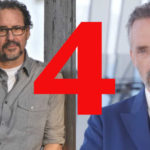
Part 4 (of 15): Evaluating Peterson’s Faith
Assessing Jordan Peterson’s 12 Rules for Life by Greg Boyd “It was in the aftermath of God’s death that the great collective horrors of Communism and Fascism sprang forth…” In the previous post I outlined the reasoning behind Peterson’s faith in the essential goodness of Being. I would now like to critically engage with this…
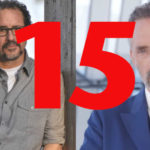
Part 15 (of 19?) — Making Sacrifice
Assessing Jordan Peterson’s 12 Rules of Life “There is a powerful call to proper Being in the story of the third temptation [of Jesus]. To obtain the greatest possible prize—the establishment of the Kingdom of God on Earth, the resurrection of Paradise – the individual must conduct his or her life in a manner that requires…

The Cosmic Dance Project
The story behind The Cosmic Dance The idea for The Cosmic Dance arose out of Greg’s sharing his latest ideas with his small group (the three couples he and his wife Shelley share life with). Theological discussions are often a regular part of the conversation when they get together, and Greg, being the theologian in…
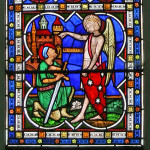
A Dialogue with Derek Flood Part 2: Is ALL of the Bible Inspired?
Image by TheRevSteve via Flickr Yesterday, I offered the first part of my response to Flood’s comments regarding my review of his book. Today I’ll finish up my thoughts. Scripture and Its Interpretation Flood confesses that he is confused as to how I can claim that “in the light of Christ, we must reject violent interpretations of Scripture”…

A Review of a Review of Benefit of the Doubt
I’d like to offer a brief response to a curious on-line review of Benefit of the Doubt, published on thechristians.com. It’s titled, Which came first, Jesus or the Bible? A clever heretic draws a false division between God and Scripture. That “clever heretic” would be yours truly, and I allegedly draw this false division in…
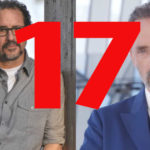
Part 17 (of 20)- Jordan Peterson on God
Assessing Jordan Peterson’s 12 Rules of Life “God, whoever or whatever he may be, is no simple granter of wishes.” Jordan Peterson In this post I would like to review and evaluate what Peterson has to say about God and in the following post I will do the same for what Peterson has to say…
